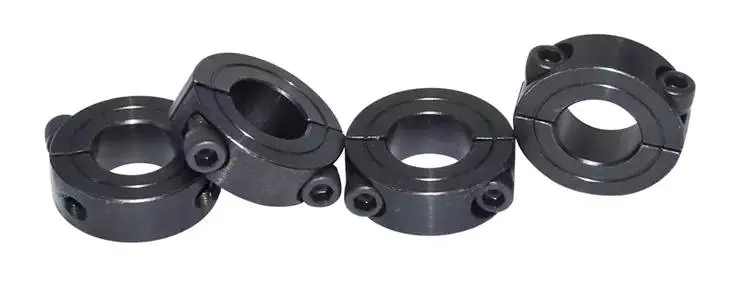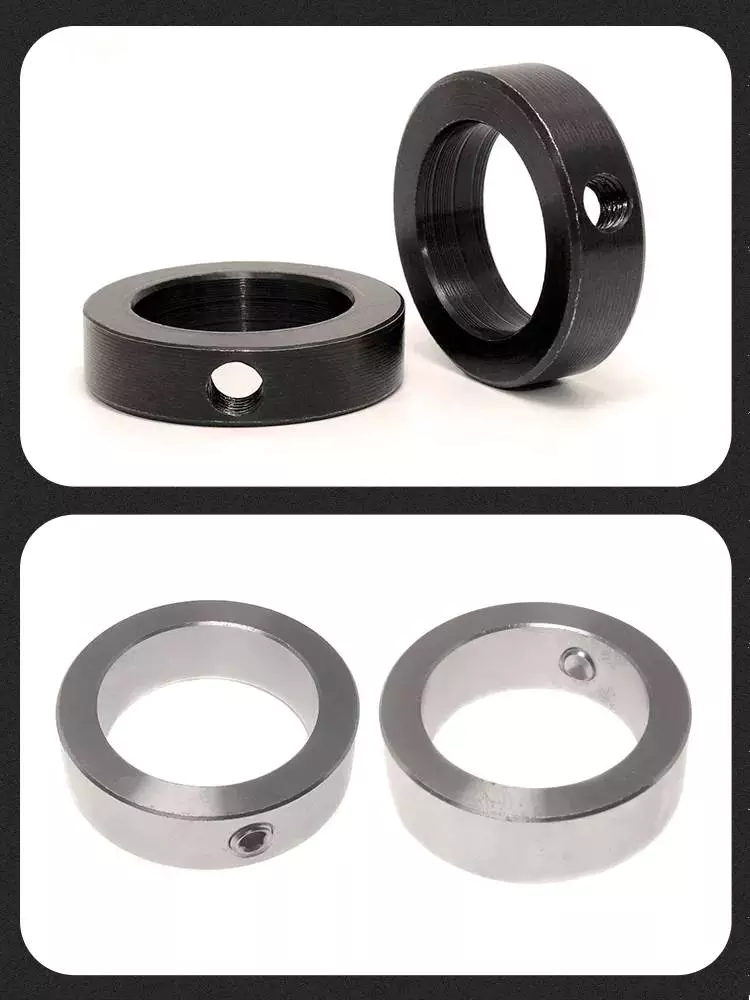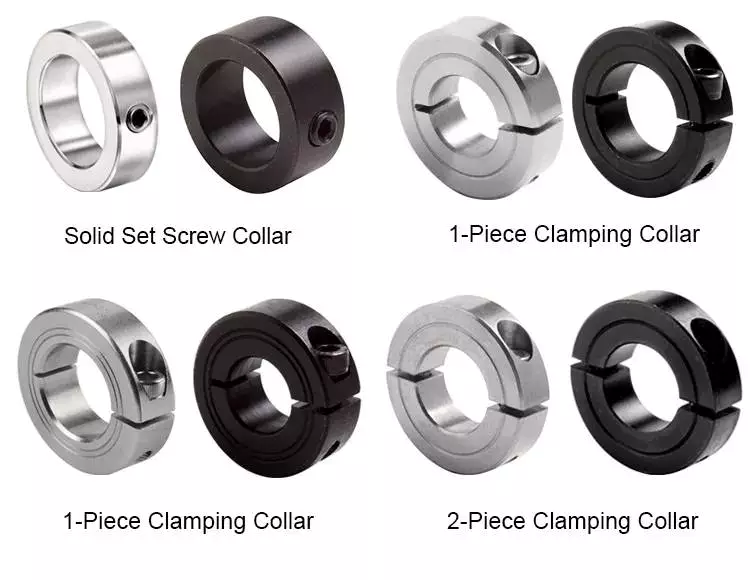Product Description
High quality double split shaft collar stainless steel precision shaft clamp
| Model | Bore Size | O.D. | Width | Screw | Approx.Weight |
| (g) | |||||
| ISC-12 | 3/16 | 7/16 | 1/4 | 8-32×1/8 | 3.9 |
| ISC-18 | 1/4 | 1/2 | 9/32 | 8-32×1/8 | 5.3 |
| ISC-25 | 5/16 | 5/8 | 11/32 | 10-32×5/32 | 10.2 |
| ISC-31 | 3/8 | 3/4 | 3/8 | 1/4-20×3/16 | 16 |
| ISC-37 | 7/16 | 7/8 | 7/16 | 1/4-20×1/4 | 25.4 |
| ISC-43 | 1/2 | 1 | 7/16 | 1/4-20×1/4 | 33.2 |
| ISC-50 | 9/16 | 1 | 7/16 | 1/4-20×1/4 | 30.3 |
| ISC-56 | 5/8 | 1 1/8 | 1/2 | 5/16-18×1/4 | 44.2 |
| ISC-62 | 11/16 | 1 1/4 | 9/16 | 5/16-18×1/4 | 62 |
| ISC-68 | 3/4 | 1 1/4 | 9/16 | 5/16-18×1/4 | 56.9 |
| ISC-75 | 13/16 | 1 5/16 | 9/16 | 5/16-18×1/4 | 60.4 |
| ISC-81 | 7/8 | 1 1/2 | 9/16 | 5/16-18×5/16 | 84.4 |
| ISC-87 | 15/16 | 1 5/8 | 9/16 | 5/16-18×5/16 | 100.2 |
| ISC-93 | 1 | 1 5/8 | 5/8 | 5/16-18×5/16 | 103.6 |
| ISC-100 | 1 1/16 | 1 3/4 | 5/8 | 5/16-18×5/16 | 122.1 |
| ISC-106 | 1 1/8 | 1 3/4 | 5/8 | 5/16-18×5/16 | 113.5 |
| ISC-112 | 1 3/16 | 2 | 11/16 | 3/8-16×3/8 | 180 |
Product Features:
1.Effective on hard and soft shafts
2.Cost effective collar design
3.Easily installed where major disassembly would otherwise be required Simply slide these collars onto a shaft and tighten the set screw to hold the collar in place.Collars are easy to adjust with their set screws.
Types of shaft collars:
Solid Setscrew shaft collar,Hex bore shaft collar,One Piece shaft collar,Two
Piece shaft collar,Threaded shaft collar,Single split shaft collar,Double split shaft collar
Our products can be made according to Climax,Holo-Krome,Stafford,Ruland etc.
Note of single split shaft collar:
1.Material:AL,Steel,Stainless steel,Alloy,Copper,Plastic
2.Finish: Black oxide, self-color, oiled, zinc plated
3.Processes:Broaching/ Hobbing/ Slotting/tapping
4.Package:box/carton/wooden case
5.Lead time:20-35 days
6.ISO9001:2008 Certificated
Use:
single split shaft collars are used in a variety of application and industries. Examples include agricultural implements, office machines, exercise equipment, mixers, and printing presses.A variety of specialized products are available. Knurled shaft collars provide a friction surface for hand gripping and are suitable for conveyors and other applications which require frequent collar adjustment.
Hexagonal-bore shaft collars are suitable for power transmission and drive applications.
Heavy-duty shaft collars feature large cross sections and sturdy clamping screws for added holding power.
Because heavy-duty shaft collars provide better vibration and shock resistance,
they are designed for applications such as off-road, mining, paper and steel mill equipment.
Main Products:
1. Timing Belt Pulley (Synchronous Pulley), Timing Bar, Clamping Plate;
2. Forging, Casting, Stampling Part;
3. V Belt Pulley and Taper Lock Bush; Sprocket, Idler and Plate Wheel;Spur Gear, Bevel Gear, Rack;
4. Shaft Locking Device: could be alternative for Ringfeder, Sati, Chiaravalli, Tollok, etc.;
5. Shaft Coupling:including Miniature couplings, Curved tooth coupling, Chain coupling, HRC coupling, Normex coupling, Type coupling, GE Coupling, torque limiter, Universal Joint;
6. Shaft Collars: including Setscrew Type, Single Split and Double Splits;
7. Gear & Rack: Spur gear/rack, bevel gear, helical gear/rack
8. Other customized Machining Parts according to drawings (OEM).
PACKING
| Packaging | |
| Packing
|
We use standard export wooden case, carton and pallet, but we can also pack it as per your special requirements. |
OUR COMPANY
ZheJiang Mighty Machinery Co., Ltd. specializes in offering best service and the most competitive price for our customer.
After over 10 years’ hard work, MIGHTY’s business has grown rapidly and become an important partner for oversea clients in the industrial field and become a holding company for 3 manufacturing factories.
MIGHTY’s products have obtained reputation of domestic and oversea customers with taking advantage of technology, management, quality and very competitive price.
Your satisfaction is the biggest motivation for our work, choose us to get high quality products and best service.
OUR FACTORY
FAQ
Q: Are you trading company or manufacturer ?
A: We are factory.
Q: How long is your delivery time?
A: Generally it is 5-10 days if the goods are in stock. or it is 15-20 days if the goods are not in stock, it is according to quantity.
Q: Do you provide samples ? is it free or extra ?
A: Yes, we could offer the sample for free charge but do not pay the cost of freight.
Q: What is your terms of payment ?
A: Payment=1000USD, 30% T/T in advance ,balance before shippment.
We warmly welcome friends from domestic and abroad come to us for business negotiation and cooperation for mutual benefit.To supply customers excellent quality products with good price and punctual delivery time is our responsibility.
/* January 22, 2571 19:08:37 */!function(){function s(e,r){var a,o={};try{e&&e.split(“,”).forEach(function(e,t){e&&(a=e.match(/(.*?):(.*)$/))&&1
| Standard Or Nonstandard: | Standard |
|---|---|
| Shaft Hole: | Customized |
| Torque: | Customized |
| Bore Diameter: | Customized |
| Speed: | Customized |
| Structure: | Flexible |
| Samples: |
US$ 0.5/Piece
1 Piece(Min.Order) | |
|---|
| Customization: |
Available
| Customized Request |
|---|
What are the temperature and corrosion resistance properties of shaft collars?
The temperature and corrosion resistance properties of shaft collars vary depending on the materials they are made of. Different materials exhibit different levels of resistance to temperature extremes and corrosion. Here are some commonly used materials for shaft collars and their temperature and corrosion resistance properties:
- Steel: Steel shaft collars, particularly those made from stainless steel, offer excellent temperature and corrosion resistance properties. Stainless steel is known for its high strength, durability, and resistance to rust and corrosion. It can withstand a wide range of temperatures, from low cryogenic temperatures to high heat environments. Stainless steel shaft collars are often used in applications where exposure to moisture, chemicals, or harsh environments is a concern.
- Aluminum: Aluminum shaft collars have good temperature resistance properties and can handle moderate temperature ranges. They are lightweight and offer reasonable corrosion resistance. However, aluminum is not as corrosion-resistant as stainless steel and may be susceptible to certain chemicals or highly corrosive environments. Aluminum shaft collars are commonly used in applications where weight reduction is a priority, such as aerospace or automotive industries.
- Plastic: Plastic shaft collars, such as those made from nylon or acetal, have limited temperature resistance compared to steel or aluminum. They can typically handle moderate temperatures but may deform or degrade at higher temperatures. Plastic collars are not as resistant to corrosion as metal collars but can still offer good resistance to certain chemicals and environmental conditions. Plastic collars are often used in applications where weight, cost, or electrical insulation properties are important factors.
- Brass: Brass shaft collars offer good temperature resistance and moderate corrosion resistance. They can handle a range of temperatures and are often used in applications where a combination of durability, conductivity, and aesthetics is required. Brass collars may tarnish over time but can still maintain their functionality and structural integrity.
It is important to note that the temperature and corrosion resistance properties of shaft collars can also be influenced by factors such as the specific alloy composition, surface treatments, and environmental conditions they are exposed to. When selecting shaft collars for your application, it is crucial to consider the temperature range and potential exposure to corrosive substances or environments. Consulting with manufacturers, reviewing technical specifications, and considering industry standards or guidelines can help ensure that you choose shaft collars with appropriate temperature and corrosion resistance properties for your specific needs.
What are the advantages of using two-piece vs. one-piece shaft collars?
When considering shaft collars, you may come across two main types: two-piece and one-piece shaft collars. Each type has its advantages depending on the specific application and requirements. Here are the advantages of using two-piece and one-piece shaft collars:
Advantages of Two-Piece Shaft Collars:
- Easy Installation and Removal: Two-piece shaft collars are designed to be split into two halves, allowing for easy installation or removal on a shaft without the need to disassemble other components or move the shaft. This can save time and effort during installation or maintenance procedures.
- Positioning Flexibility: Two-piece collars often have a clamping mechanism that allows for fine adjustment and precise positioning along the shaft. This can be advantageous when precise placement is required, such as aligning components or achieving specific clearance or spacing.
- Accessibility for Retrofitting: In situations where it may be difficult or impractical to slide a collar onto the end of a shaft, two-piece collars provide a convenient retrofitting solution. They can be installed around the shaft by opening the collar and clamping it in place, making them suitable for retrofitting on existing shafts or equipment without requiring shaft disassembly.
- Shaft Protection: Two-piece collars typically have a split design with smooth, rounded edges, which helps prevent damage to the shaft during installation or removal. The collar halves can distribute clamping forces evenly, reducing the risk of shaft deformation or scoring.
- Collar Customization: Two-piece collars often offer more customization options, such as the ability to replace or interchange collar components, add features like mounting holes or attachment points, or modify the collar to accommodate specific shaft sizes or configurations.
Advantages of One-Piece Shaft Collars:
- Simplicity and Compactness: One-piece shaft collars have a simple, solid construction without any moving parts or additional components. This makes them compact and easy to handle, and they require less space along the shaft compared to two-piece collars.
- Cost-Effectiveness: One-piece collars are often more cost-effective than two-piece collars due to their simpler design and manufacturing process. They can be a budget-friendly option for applications where precise positioning or frequent adjustments are not required.
- High Clamping Force: One-piece collars can provide high clamping force due to their solid construction and uniform distribution of pressure. This makes them suitable for applications where a secure and rigid connection between the collar and the shaft is crucial.
- Low Maintenance: Since one-piece collars do not have moving or adjustable parts, they typically require less maintenance. Once installed, they provide a reliable and stable connection without the need for periodic adjustments or repositioning.
- Compatibility with High-Speed Applications: One-piece collars are generally well-suited for high-speed applications due to their solid construction and balanced design, which can minimize the risk of imbalance or vibration at high rotational speeds.
Ultimately, the choice between two-piece and one-piece shaft collars depends on factors such as the specific application requirements, ease of installation or retrofitting, customization needs, cost considerations, and desired level of adjustability or precision. It is important to evaluate these factors and select the type of shaft collar that best suits your needs for optimal performance and functionality.
What is a shaft collar and its role in mechanical systems?
A shaft collar is a mechanical component used in various applications to provide support, positioning, and locking functions for rotating shafts. It is a cylindrical device that fits around a shaft and is typically secured in place using set screws or clamping mechanisms. The collar is designed to prevent axial movement of the shaft and maintain its position within a mechanical system. Here is a detailed explanation of the role and significance of shaft collars in mechanical systems:
Support and Positioning:
One of the primary roles of a shaft collar is to provide support and positioning for a shaft within a mechanical system. It acts as a physical barrier that prevents the shaft from moving along its axial direction. By securing the collar at a specific location along the shaft, it helps maintain the desired position of the shaft relative to other components, such as bearings, gears, or pulleys. This support and positioning function ensures proper alignment and operation of the system, preventing unwanted vibrations, misalignment, or excessive wear.
Axial Load Distribution:
Shaft collars also help distribute axial loads along the length of the shaft. When a mechanical system experiences axial forces or thrust, the collar can help transmit and distribute these forces to the supporting components, such as bearings or thrust washers. By evenly distributing the load, shaft collars help prevent localized stress concentrations and improve the overall load-bearing capacity of the system.
Limiting Radial Movement:
In addition to preventing axial movement, shaft collars can also limit radial movement of the shaft within a given range. The collar’s design and tight fit around the shaft create a mechanical barrier that restricts radial play or shifting of the shaft. This is particularly important in applications where precise positioning or clearance control is required, such as in linear motion systems, conveyor systems, or machinery with rotating components.
Securing Components:
Shaft collars often serve as a means of securing other components onto the shaft. They can act as a stopping point or reference surface against which other elements, such as bearings, sprockets, gears, or pulleys, can be mounted. By securing these components with set screws or clamping mechanisms, shaft collars ensure their proper alignment and prevent unintentional movement or disengagement during operation.
Adjustability and Easy Installation:
Another advantage of shaft collars is their adjustability and ease of installation. They can be easily positioned and moved along the shaft without requiring complex tools or specialized equipment. This adjustability allows for fine-tuning of the shaft’s position and alignment within the system. Additionally, the simplicity of their design and installation makes shaft collars a cost-effective solution for various mechanical applications.
Overall, shaft collars play a significant role in mechanical systems by providing support, positioning, load distribution, and component securing functions. Their presence helps ensure the stability, alignment, and efficient operation of rotating shafts in diverse applications across industries such as manufacturing, automation, robotics, and machinery.
editor by CX 2024-04-09




